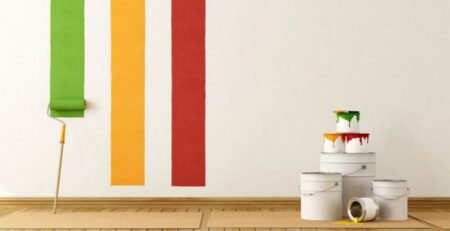Maintaining the Interior Paint of You Home
A professional interior paint job can do wonders for showcasing your personal style and making your home a special, comfortable space for you and your loved ones. So it’s no surprise that most homeowners want their interior paint job to last for as long as possible. Luckily, there are several things you can do to extend the longevity of a new paint job. Following these simple interior paint care tips will keep your home’s walls looking fresh for years.
1. Gently Clean High-Touch Surfaces Regularly
Staying on top of cleaning the high-touch areas will go a long way toward keeping that freshly painted look. Regularly wiping down areas like door frames, windowsills, banisters, and the area around the light switches will prevent buildup of natural oils, body lotions, or any grime that can make your surfaces look dingy and damage the paint. However, make sure you use a gentle cleaner and don’t apply to much pressure.
2. Keep Leftover Paint Handy for Touch Ups
Make sure to store your leftover paint in a cool, dry place, and have it clearly labeled with the corresponding room. If you have the same color paint and a clean brush on hand, you’ll be more likely to take care of those small touchups before they become bigger and more noticeable problems. Remember to try cleaning the spot first, and only resort to paint touchups when the coverage is compromised, or the stain cannot be removed.
3. Watch for Mildew and Address Immediately
Woman’s face, arm, and yellow-gloved hand. She’s cleaning mold off a wall near a window blinds with a sponge.
Without proper upkeep, mold and mildew can become a problem fast in bathrooms, kitchens, and around windows, especially if you live in an area with high humidity or extensive rainfall. Mildew can be very hard to combat, so catching it early is important, before it seeps further into the paint and spreads.
High-quality, moisture and mold-resistant primers and paint finishes help to prevent this issue. You can also reduce the moisture in the room, thereby making the environment less conducive to the mold and mildew. Opening a window while cooking and always using the exhaust fan, even when boiling water will help in the kitchen. Make sure to always use your exhaust fan and crack a window, if you have one, in the bathroom when showering or bathing. Dehumidifiers and frequently airing out your house on sunny days will help in the rainy season and in humid areas.
4. Avoid Scuffs from Furniture and Doors
One of the most common sources of paint damage is scuffs, or dents from furniture and doors. If you have dinette, desk, or living room chairs that get pushed back close to the walls, consider installing chair rails or wainscotting to protect the walls. You can also just pull the table out further and move the chairs further into the room, away from the walls. To prevent damage from doorknobs, ensure that you have a good door stop for any doors that swing into walls.



